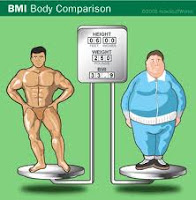Adopt a diet providing very little protein may reduce lean mass your body has. Here is why.
People who consume excess calories through a diet depleted in protein may gain less weight than others, according to the findings of a study novella, but this has a cost: the loss of lean body mass (the Capital muscle.)
In a randomized single-blind (patients are divided into groups randomly, and ignore what group they are) published in the January issue of the journal " Journal of American Medical Association, "the researchers hospitalized 25 volunteer patients and asked them to follow a special diet in order to stabilize their body weight for 2 to three weeks.
The context of the study is simple: know the role of diet composition in response to overfeeding and energy dissipation in humans. The final goal remains to assess the effects of providing low power / normal / high protein on weight gain, energy expenditure and body composition.

In all, the study lasted between 10 and 12 weeks (including the initial period of 2 to three weeks dedicated to the regime stabilizer weight). The 25 volunteers were U.S. citizens, were aged between 18 and 35, had a BMI between 19 and 30.
For the last eight weeks, the researchers randomly assigned the volunteers to three groups, each consuming 954 calories more per day (compared to the amount consumed daily calories during the initial period):
- Group A, low consumption of protein: 6% of calories from protein, 52% fat, 42% carbohydrates.
- Group B, eating protein to normal levels: 15% protein, 44% fat, 41% carbohydrates.
- Group C, absorbing a lot of protein: protein 26%, 33% fat, 41% carbohydrates.
With 954 extra calories daily, this means that the three groups of volunteers were fed for eight weeks with 40% more calories than during the initial period (2 to three weeks dedicated to a scheme to stabilize the body weight ).
Body composition (lean mass, fat mass) was measured using the "X-ray photon absorption "twice a week. Energy expenditure (calories burned) at rest was assessed weekly by a ventilated hood. The total energy expenditure was gauged by the method to the doubly labeled water (production of carbon dioxide from the subject is measured noninvasively and in compliance with lifestyle) before periods of overeating and stabilization, then during the seventh and eighth weeks.
Unsurprisingly, everyone gained weight Those in group B (15% protein) and C (26% protein) gained an average of 6 kgs, and those in group A (6%) had 3.2 kilos.
Everyone took about 3.4 pounds of body fat. The amount of body fat had increased similarly in all groups and represented 50% to over 90% of the calories stored in too. However, the results for FFM were different.
Group B had 2.85 kg of lean mass, and consumers in group C had taken 3.17 kg in lean body mass. As for the eating group A, they lost 0.7 kg of lean body mass.
"By adopting a diet low in protein, the body must get protein from somewhere, and he draws on lean mass," said Dr. George A. Bray, the lead author and professor of medicine at the University of the State of Louisiana. "You lose lean body mass when you eat too little protein foods, and no one will tell you to do that. "
In conclusion, in people living in a controlled environment, calories alone are responsible for the increase of body fat. Proteins affect calorie consumption and storage of lean body mass, but not the storage of fat in the body.
These results may lead some people to think immediately that a low-protein diet is best. Certainly, the excess calories consumed increased body fat while increasing lean body-mass proteins, but in reality, this is true in people taking a high-carbohydrate diet (that is the case in this study also).
Moreover, a conclusion is hasty parallel whereas several other randomized studies show that calorie restriction is not the key to weight loss but the carb.
A reserve is maintained on the low number of study participants. Only 25 patients were studied, and when they are divided into three groups, the statistical validity of the study becomes problematic. Nevertheless, the authors should be commended for their efforts, especially since they have to follow some patients a diet high in protein, that "conventional wisdom," says that can cause kidney damage (although n ' there is no scientific data to support this thesis in healthy people).
Notice: Want to know when we update our site? Enter your email address below and be notified by mail every time we update our site